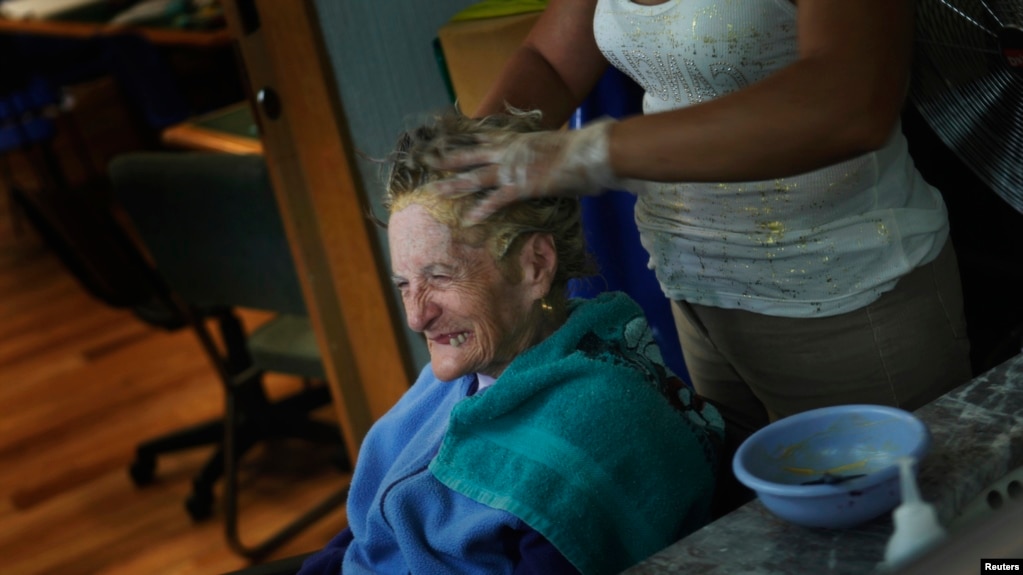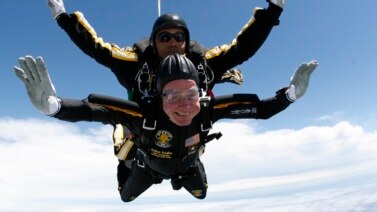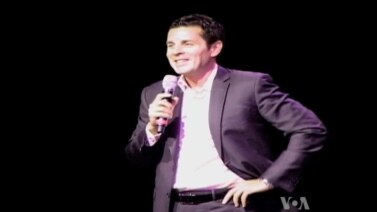
Welcome to 30 minutes of VOA learning English. The voice of America's information service for people learning English. Join us now for the Economics Report and American mosaic coming up after As It Is.
This is As It Is. Hello, I’m Caty Weaver. On the show today, we discuss issues affecting the elderly and those who care for them.
We start with a report from Karen Leggett about a British study. It examines the connection between social activity and death rates among older people.
Then we visit a different kind of day care in Virginia. It provides important services to people with dementia and their caregivers.
A new study has found that older people who are socially active might live longer than those who are alone more. But researchers say loneliness is not the main problem. Karen Leggett has more.
A number of studies have linked both loneliness and social isolation with an increased risk of death. What’s the difference? Andrew Steptoe is with University College London. He says social isolation means limited or no contacts with friends and family, or involvement in groups or sports.
“Whereas loneliness is a more subjective experience to do with a person’s feelings of companionship or feeling left out.”
However, there is a strong connection between loneliness and social isolation. Professor Steptoe and his research team wanted to find out which one was more important. The research team examined information from a large study of older men and women called the English Longitudinal Study of Aging. They found no meaningful difference between higher death rates and loneliness. But social isolation was a different issue.
“And when we did the statistical analysis, what we found was that social isolation was indeed related to higher risk of dying.”
It is not clear why people with more social contacts are likely to live longer. There are some apparent reasons, like a person is more likely to survive a heart attack if someone nearby calls for help. But Andrew Steptoe suggests other reasons.
“Receiving encouragement to do things or not to do things, other people to help you with your medications or take you to the doctor, and things of that sort – which are not so much to do with the emotional side of it as more the practical side. And it could be that those things are the more important factors here.”
The study was done in Britain. Professor Steptoe says studies are taking place in other places where traditional social systems are changing.
“In many developing countries, of course, people with a rural background are moving into the larger cities, where the social connections are very, very different, and often it’s the younger people who are moving, leaving the older people in the more rural areas. And so these kinds of social connections are going to be changed dramatically.”
The research into social isolation and death rates was published online in the Proceedings of the National Academy of Sciences.
I’m Karen Leggett.
Specialized Care for Alzheimer's Patients
You are listening to AS IT IS, from VOA Learning English.
As America’s population of elderly grows, so, too, does the need for specialized care for adults with Alzheimer's disease or other forms of dementia. We recently visited a center in Fairfax, Virginia, that provides such care and also supports the family members who are the main caregivers for the patients.
Linda Roberts’ mother – like more than five million other Americans – has Alzheimer’s.
“I went to visit her five years ago, found out some stuff was going on. I packed her up that weekend and took her home.”
Linda Roberts joined more than 15 million American family members and friends caring for someone with Alzheimer’s. The brain disease causes problems including memory loss and personality changes. Over time, body functions fail, causing death.
Linda Roberts says it has been terrible to watch her mother struggle with the disease. Being her only caregiver has also been difficult.
“It’s extremely stressful. Keeping my patience, trying to over and over repeat things that I need to get done. I think that’s my frustration.”
Two years ago, Ms. Roberts found help at the Alzheimer’s Family Day Center. The Center provides a supervised, enriching environment where dementia patients can spend the day.
“It’s really given me time to do things during the day and pursue some hobbies or have some time to myself.”
That is Howard Simmons. He began bringing his wife to the center three years ago. She was diagnosed with Alzheimer’s in 2006.
“In about ’07, ’08, I’m becoming quite frustrated because when you’re the principal caregiver and they’re home, you’re doing everything. You know, I became the cook, the cleaner.”
He says his mind has been eased because his wife is well cared for every day.
Lisa Wright is Program Manager for the Alzheimer’s Family Day Care.
Ms. Wright says day care workers also provide a wide expanse of activities that are therapeutic and fun.
“We have an artist come in and do just specific art with small groups. We have musical therapy where we have a lady that brings in instruments and they all get to play the instruments. We have a physical therapist here two days a week. We have a ballroom dancer that comes in. I think that’s probably the favorite. We do a lot of mind challenging games.”
The Alzheimer’s Family Day Care also offers services for caregivers.
“We have a support group that they can come and just share with one another. We have an outreach group and education.”
Galeet BenZion has depended on that help. Her husband learned he had early onset Alzheimer’s in his fifties.
“The first thing I felt was that I really need a whole lot of support because I didn’t know anything about Alzheimer’s. And, I certainly was not prepared to be alone at age 45, meaning take care of a house and kids and mortgage and everything else that life entails.”
Caregiver Howard Simmons says it is helpful to meet with other caregivers and share experiences and advice. He’s grateful that such services are available for him and his wife.
“I can’t say she’s improved, but it gave her something to do and she enjoys it.”
An App for Caregivers
Have you heard there is an app for Alzheimer’s disease? Faith Lapidus tells us about this other service for family members and friends who care for someone with the disease.
Balance is an iPhone and iPad application that offers caregivers helpful information about Alzheimer’s. These include recognizing the signs of the disease and knowing how to make sure it is correctly identified by a doctor. The Balance app also provides advice on daily care for an Alzheimer’s patient, including feeding, bathing and hygiene.
The $4 app can be purchased online.
David Pomeranz is program director for the Hebrew Home in Riverdale, New York. The organization provides care to older adults.
David Pomerantz came up with the idea for the Balance software. He says it provides the latest medical research news on Alzheimer’s. And he says Balance lets caregivers organize and record medical information about patients. He says caregivers need support so they can help their loved one.
An estimated 30 million people around the world have Alzheimer’s disease. Mr. Pomeranz says the Balance app is being downloaded by caregivers around the world.
I’m Faith Lapidus.
And that’s AS IT IS for today. I’m Caty Weaver.
We want to know what you want to hear about on AS IT IS. Send an e-mail to learningenglish@voanews.com. And remember, you can get the latest world news on VOA at the beginning of the hour Universal Time.





